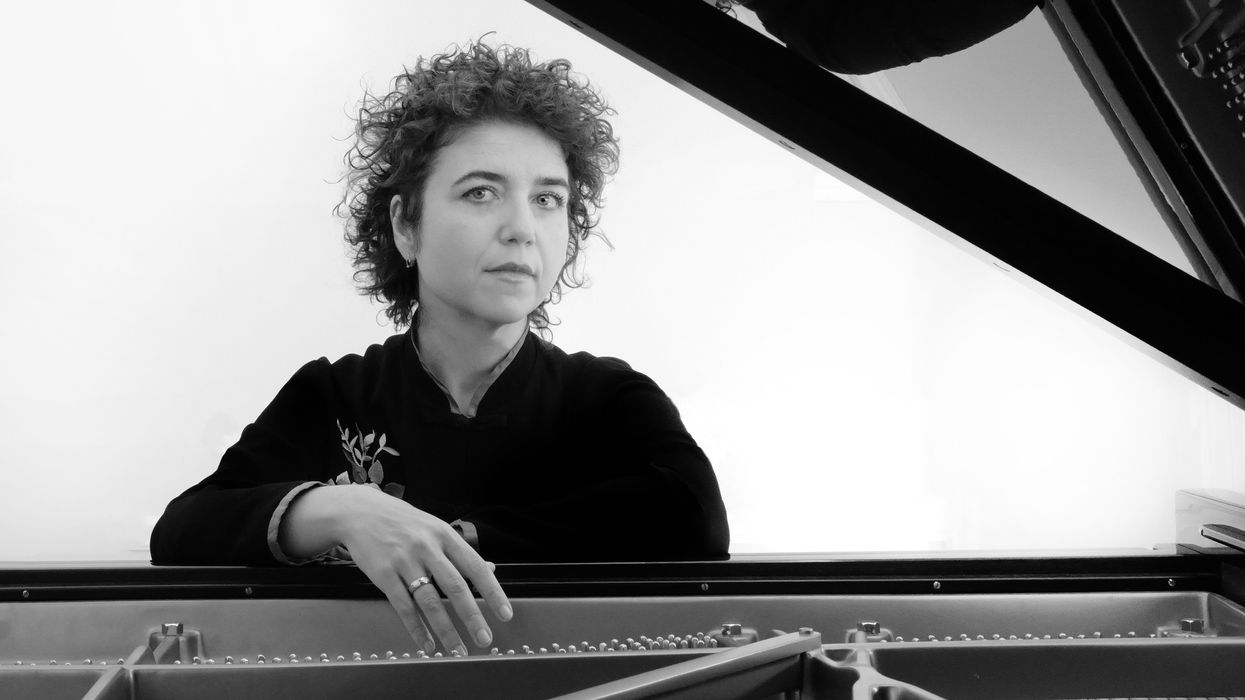‘Little Mermaid’ Ballet Makes a Splash at the Wortham with Complex, ‘Transcendent’ Score

Composer Lera Auerbach (photo by Raniero Tazzi)
IN A RECENT televised interview with late-night talk show host Stephen Colbert, Australian singer/songwriter Nick Cave eloquently described music as “one of the last legitimate opportunities we have to experience transcendence.” It was a surprisingly deep statement for a network comedy show, but anyone who has attended a loud, sweaty rock concert, or ballet performance with a live orchestra, knows what Cave is talking about.
That word transcendence appears repeatedly in the program notes for the Houston Ballet company premiere of John Neumeier’s The Little Mermaid, and comes up frequently in conversation with the ballet’s composer, Lera Auerbach. Based on the haunting 1837 fairy tale by Hans Christian Andersen, who infused the fantastical story with elements of his autobiography, The Little Mermaid runs at the Wortham Theater Sept. 6-15.
“Music transcends language,” says Auerbach, whose music easily slips between recognizable classical idioms and more cryptic vernaculars and, like the mermaid’s song, seduces and pulls the listener into unfamiliar and mysterious sonic worlds. “Music can change and forever alter your life, without you necessarily knowing why.”
Born in 1973 in Chelyabinsk, a large industrial city in Russia’s Ural Mountains, Auerbach began composing music at age four, inspired by her mother, who taught piano at the Tchaikovsky Music College, and her father, who had a passion for literature. “I would create stories,” says Auerbach, describing her early explorations at the piano. “I would illustrate them with notes.” During her childhood, Chelyabinsk was a “closed city,” meaning no foreigners were allowed to enter it. Scientific experiments took place along the city’s borders, and Chelyabinsk became one of the most polluted and radioactive cities in the world. However, as is sometimes the case in such oppressive environments, there were plenty of opportunities for Auerbach to hear great classical music, including concerts by pianist Sviatoslav Richter and violinist Gidon Kremer, who would later record and become an advocate of Auerbach’s music. “My mother lived and breathed music,” says Auerbach. “We never missed a concert.”

Houston Ballet Principals Karina González and Skylar Campbell rehearsing John Neumeier’s The Little Mermaid (photo by Amitava Sarkar, courtesy of Houston Ballet)

Artists of the Houston Ballet with choreographer John Neumeier(photo by Amitava Sarkar, courtesy of Houston Ballet)

Houston Ballet Principal Karina González and artists of the Houston Ballet rehearsing John Neumeier’s The Little Mermaid (photo by Amitava Sarkar, courtesy of Houston Ballet)
In 1991, Auerbach’s talent as a concert pianist and composer brought her to the U.S. for a performance. Before returning, she made an abrupt decision to defect and expand her artistic horizons, even though her mother and father were still in Russia. “They missed ten years of my life,” says Auerbach, who eventually was able to bring her parents to live in the U.S. and once again take comfort in seeing them in the audience for her performances. (Auerbach’s father passed three months ago. Her mother is still alive.)
The Little Mermaid is Auerbach’s second collaboration with Neumeier, but the first where she was asked to compose music for a ballet that had yet to be choreographed. Their first collaboration, Préludes CV, used Auerbach’s 24 Preludes for Violin and Piano and 24 Preludes for Cello and Piano for music, and several performances featured Auerbach herself at the piano. The experience gave her “great insight” into how dancers work with music and would help her imagine the music and movement for The Little Mermaid, which began with Neumeier’s one-page treatment of the ballet with approximate timings. “In a way, as I was writing, I was using my imagination to see how it might be,” says Auerbach. Due to the time constraints set for the 2007 world premiere, the music began as a piano score she composed and played for the ballet’s rehearsals. Auerbach describes the resulting orchestral score, which features both solo violin and the theremin as the “voice” of the little mermaid, as “Incredibly complex … and almost impossible to give any justice on the piano.”
Named after its inventor Leon Theremin, who patented the electronic instrument in 1928, the eerie expressive sound of the theremin can be heard in the theme for the British television show Midsomer Murders and in the chorus of The Beach Boys' influential and groundbreaking pop masterpiece “Good Vibrations.” Using one hand to control the pitch, and the other for the volume, the performer’s gestures are detected by the instrument’s antennae and transformed into sounds that seem to be pulled out of thin air.
“It’s an extraordinarily difficult instrument to play well,” says Auerbach. “It’s almost like meditation because you have to control everything, including your breathing.” After the premiere of The Little Mermaid, Auerbach received a theremin from Moog Music as a thank you for bringing attention to the instrument but has yet to attempt to play it. (Darryl Kubian will play the theremin for the Houston Ballet performances.)
Returning to the subject of transcendence, Auerbach points out that the protagonist of The Little Mermaid, a young, beautiful girl with scales and a fishtail, who leaves the sanctuary of her undersea home to covet the unrequited love of a handsome prince, discovers her true essence by betraying and rising above her nature. “Mermaids are murderous creatures,” laughs Auerbach. “But she transcends all of that. She’s a mermaid, she’s a human, she’s a creature of the air. … She’s Andersen, and she’s every one of us who made sacrifices for something we felt was the right thing to do.”









